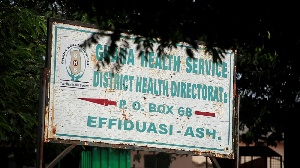Health News of Wednesday, 9 April 2025
Source: www.ghanawebbers.com
Sekyere East District steps up fight against silent killers
Non-Communicable Diseases (NCDs) like hypertension, stroke, diabetes, and heart disease are affecting all people in Ghana. Once thought to be diseases of the rich, they are now claiming lives and straining healthcare resources. However, one district is fighting back.
In Sekyere East District, health officials are increasing efforts against NCDs. They focus on education, early detection, and community outreach. Dr. Justice Ofori-Amoah leads these efforts as the District Director of Health Services. He emphasizes that “no stone will be left unturned” in their mission to protect lives.
Dr. Ofori-Amoah states they are committed to reducing NCD numbers. The District Health Management Team collaborates with various stakeholders to tackle this issue. Many conditions stem from poor diets and have become a major concern in Sekyere East.
Akwasi Boateng died at 61 due to high blood pressure. His brother Samuel Wiredu shared that Akwasi ignored his medication. This loss has deeply affected their family.
“Our mother is also battling hypertension now,” Samuel said. “We are doing all we can to help her.” Their experience reflects a broader trend; many families in Ghana face similar losses.
Akua Tiwa is 57 and has lived with high blood pressure for years. She takes her medicine daily but fears complications may arise. “It’s scary,” she admits.
Seventy-three-year-old Akua Boakyewaa suffered a life-changing stroke. She now relies on her daughter Patricia for everything. “She can’t walk or do anything by herself anymore,” Patricia explained.
Esther Kusi is 34 and manages diabetes daily. Her life revolves around controlling her blood sugar levels and avoiding triggers. “I try to eat well and take my medicine, but it’s not easy,” she said.
Health workers play a crucial role in managing these conditions. Rose Mary Aboagye works at the Ntunkumso CHPS compound and helps patients like Esther seek care sooner. “Many people wait too long before seeking help,” she noted.
The district has opened a cervical cancer clinic to support women’s health needs and raise awareness about prevention through early screening. Public health nurse Belinda Darkuwa sees many advanced cases due to fear of hospitals.
“The cancer is already advanced by the time they come,” she said.
The Ghana Health Service and Ashanti Regional Health Directorate are actively promoting healthy living through campaigns led by officials like Dr. Fred Adomako.
Globally, NCDs cause 41 million deaths each year—about 70% of all deaths worldwide. In Ghana, NCDs account for 43% of deaths, with cardiovascular diseases being the leading cause.
In Sekyere East District, hypertension cases have steadily declined over five years: from 6,764 cases in 2020 to just 1,660 documented by October 2024—a drop of 75%. This progress suggests improved awareness and treatment adherence among residents.
However, health officials remain vigilant about potential underreporting or undiagnosed cases still present in the community.
According to WHO predictions, if no action is taken, NCDs could become Africa's leading cause of death within the next 15 years.
Dr Ofori-Amoah believes increased awareness encourages more people to seek medical help early on: “Most of them are being kept under medication.”
Despite declining numbers in Sekyere East District, experts stress that prevention remains key for managing NCDs effectively through healthy lifestyles and regular check-ups.
Dr Ofori-Amoah insists that while progress has been made, the fight against NCDs continues: "If communities work together with health workers," he says confidently about Ghana's future success against these diseases.
Samuel Wiredu reflects on his brother's passing: “If my brother had taken his condition seriously... I don’t want others to suffer like this.”











